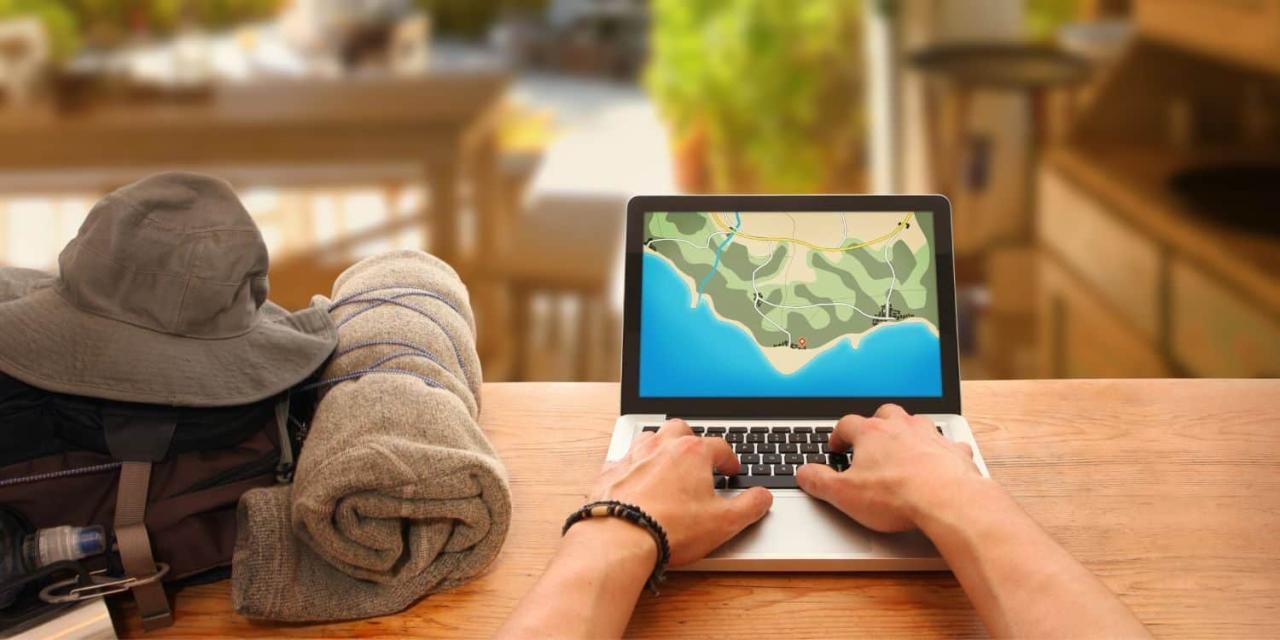The traditional 9-to-5 office paradigm is rapidly being reshaped by a revolutionary lifestyle: that of the digital nomad. These intrepid individuals leverage technology to work remotely, freeing themselves from geographical constraints and enabling a life of continuous travel and global exploration. More than just a trend, digital nomadism represents a profound shift in how we approach work, travel, and personal freedom, challenging conventional notions of productivity and lifestyle. For professionals seeking adventure, cultural immersion, and an escape from routine, this path offers unparalleled opportunities. This comprehensive article delves into the fascinating world of digital nomads, exploring what defines this burgeoning community, the essential tools and skills required, the profound economic and social impacts they create, and the exciting future that lies ahead for this boundary-breaking way of life.
The Essence of the Digital Nomad Lifestyle

Digital nomadism is characterized by location independence, enabled by technology, allowing individuals to earn a living while traveling the world. It’s a deliberate choice to prioritize flexibility, experience, and personal growth.
A. The Core Principle
At the heart of digital nomadism is location independence. This means:
A. Remote Work: The ability to perform one’s professional duties entirely from any location with an internet connection. Common digital nomad professions include web developers, graphic designers, writers, online marketers, virtual assistants, consultants, and customer support specialists.
B. Flexible Schedules: While demanding discipline, remote work often offers flexibility in work hours, allowing nomads to adapt their schedules to different time zones or leisure activities.
C. Borderless Living: A rejection of a fixed geographical base, embracing continuous or semi-continuous travel across countries and continents.
D. Technology as an Enabler: Relying heavily on laptops, smartphones, reliable Wi-Fi, and cloud-based tools to perform tasks and communicate with clients or employers.
This freedom from a physical office space is the fundamental enabler of the digital nomad lifestyle.
B. Who Becomes a Digital Nomad?
The digital nomad community is incredibly diverse, comprising individuals from various backgrounds and professions.
A. Freelancers and Consultants: A large segment, offering specialized services to multiple clients globally. They control their workload and travel schedule.
B. Entrepreneurs: Building and running online businesses, often e-commerce stores, SaaS companies, or content platforms, that operate independently of location.
C. Remote Employees: Individuals whose companies have embraced remote work policies, allowing them to perform their jobs from anywhere with an internet connection.
D. Creators and Influencers: Generating income through content creation (blogging, vlogging, social media) and often leveraging their travel experiences as part of their brand.
E. Teachers and Tutors: Delivering online education, from language instruction to specialized academic subjects.
This diversity highlights the broad applicability of location-independent work.
C. Key Motivations for Embracing Nomadism
The allure of the digital nomad lifestyle stems from a blend of personal and professional motivations.
A. Desire for Travel and Exploration: A deep yearning to see the world, experience new cultures, and have continuous adventure without waiting for limited vacation days.
B. Cost of Living Arbitrage: Moving to countries where the cost of living is significantly lower, allowing earnings from higher-paying economies to stretch further, improving quality of life.
C. Work-Life Balance: Seeking greater control over their schedules, reducing commute times, and integrating work with personal pursuits and leisure activities.
D. Personal Growth and Learning: The constant exposure to new environments, languages, and cultures fosters adaptability, resilience, and a broader worldview.
E. Escaping Routine and Monotony: A desire to break free from the conventional nine-to-five grind and the feeling of being tied to one location.
D. Essential Tools and Technologies
The digital nomad’s existence is inextricably linked to a suite of essential tools and technologies.
A. Reliable Laptop and Peripherals: A powerful, lightweight laptop, possibly with external monitors or portable keyboards for productivity.
B. Robust Internet Connectivity: Access to high-speed, stable Wi-Fi is non-negotiable. This often involves researching local SIM cards, portable Wi-Fi devices, and co-working spaces.
C. Cloud-Based Productivity Suites: Tools like Google Workspace, Microsoft 365, Slack, and Trello enable seamless collaboration, document sharing, and project management from anywhere.
D. Communication Platforms: Zoom, Google Meet, Skype, and WhatsApp for video calls, voice calls, and messaging with clients, colleagues, and friends/family.
E. Cybersecurity Tools: VPNs (Virtual Private Networks) for secure internet Browse, strong passwords, and two-factor authentication to protect sensitive data while working on public networks.
F. Online Payment Systems: PayPal, Stripe, Wise (formerly TransferWise) for sending and receiving international payments.
G. Travel Planning Apps: Tools like Google Maps, Rome2rio, and various booking platforms for flights, accommodation, and local transport.
E. Challenges and Considerations
While alluring, the digital nomad lifestyle comes with its own set of challenges and considerations.
A. Visa and Immigration: Navigating complex visa requirements, particularly for long-term stays in different countries, can be a significant hurdle. The rise of specific digital nomad visas is helping address this.
B. Healthcare and Insurance: Securing adequate health insurance that covers international travel and remote work is crucial. Accessing healthcare in unfamiliar countries can be daunting.
C. Maintaining Productivity: The allure of travel can sometimes distract from work, requiring strong self-discipline and time management.
D. Social Isolation: Despite constant travel, establishing deep, lasting friendships can be challenging due to frequent moves.
E. Financial Volatility: For freelancers and entrepreneurs, income can be unpredictable, requiring careful financial planning and a robust emergency fund.
F. Time Zone Differences: Managing client or team communication across multiple time zones can be complex.
The Economic and Societal Impact of Digital Nomads
The growing digital nomad community is creating significant economic and social ripples, particularly in host countries and the global travel industry.
A. Boosting Local Economies and Tourism
Digital nomads are a new breed of tourist who contribute significantly to local economies and tourism.
A. Longer Stays: Unlike traditional tourists, nomads stay in destinations for weeks or months, spending more on local accommodation, food, services, and entertainment.
B. Diversified Spending: They utilize a wider range of local businesses, from co-working spaces and local cafes to laundry services and public transportation, injecting money beyond typical tourist traps.
C. Off-Season Revenue: Nomads often travel during shoulder or off-peak seasons to leverage lower costs, providing much-needed revenue for local businesses outside peak tourist times.
D. Stimulating Local Services: Their presence encourages the development of services catering to remote workers, such as co-working spaces, specialized cafes, and community events.
This sustained local spending provides a stable economic boost, especially in smaller towns or less-traveled regions.
B. Driving Demand for Co-Working Spaces and Flexible Accommodation
The digital nomad lifestyle has directly fueled the booming demand for co-working spaces and flexible accommodation.
A. Co-Working Hubs: Cities worldwide are seeing a proliferation of co-working spaces that offer reliable internet, ergonomic setups, and a community environment for remote workers.
B. Long-Term Rentals: Nomads often opt for apartment rentals or extended-stay hotels over traditional short-term hotel stays, creating a new demand segment in the rental market.
C. Specialized Accommodation: The emergence of “coliving” spaces designed specifically for digital nomads, blending private rooms with shared communal areas and integrated work facilities.
This has spurred innovation in the real estate and hospitality sectors.
C. Fostering Innovation and Entrepreneurship
The digital nomad community is a hotbed of innovation and entrepreneurship.
A. Remote Business Models: Nomads are constantly developing and refining business models that thrive on location independence, inspiring others.
B. Cross-Cultural Collaboration: The diverse backgrounds and experiences of nomads foster unique collaborations and new ideas that might not emerge in traditional office settings.
C. Knowledge Transfer: Nomads often bring skills and knowledge from developed economies to less developed regions, contributing to local skill enhancement.
Their entrepreneurial spirit creates new services and opportunities.
D. Influencing Urban Development and Policy
As their numbers grow, digital nomads are increasingly influencing urban development and policy.
A. Digital Nomad Visas: Countries like Portugal, Croatia, and Indonesia have introduced specific digital nomad visas or similar schemes to attract this desirable demographic, recognizing their economic contributions.
B. City Planning: Urban planners are considering amenities and infrastructure (e.g., public Wi-Fi, bike lanes, green spaces) that appeal to remote workers who value quality of life.
C. Local Tax Revenue: While sometimes complex, nomads’ spending and potential tax contributions can add to local government revenue, especially with new visa programs designed to capture this.
This demographic is reshaping how cities think about attracting talent and investment.
E. Promoting Cultural Exchange and Soft Diplomacy
Digital nomads, by living and working in diverse cultures, act as informal ambassadors, promoting cultural exchange and soft diplomacy.
A. Breaking Stereotypes: Their direct interactions with locals can help break down stereotypes and foster mutual understanding.
B. Sharing Perspectives: They often share their experiences online, providing authentic insights into different cultures and encouraging more responsible tourism.
C. Local Integration: Many nomads actively learn local languages, participate in community events, and engage with local customs, fostering deeper connections than traditional tourists.
This grassroots interaction contributes to a more interconnected and understanding world.
Navigating the Digital Nomad Journey

For aspiring or current digital nomads, strategic planning and proactive management are key to a successful and sustainable nomadic life.
A. Secure a Stable Remote Income Source
Before embarking, ensure you have a stable remote income source.
A. Client Base: For freelancers/consultants, build a solid client base that allows for consistent work and income.
B. Remote Job: For employees, secure a fully remote position with a supportive company culture.
C. Passive Income: Develop passive income streams (e.g., online courses, e-books, affiliate marketing) to add financial stability.
Reliable income is the bedrock of location independence.
B. Plan Your Finances Meticulously
Meticulous financial planning is crucial for managing unpredictable income and international expenses.
A. Emergency Fund: Have a robust emergency fund (at least 6-12 months of living expenses) to cover unexpected costs or periods of low income.
B. Budgeting Tools: Use budgeting apps to track income and expenses across different currencies.
C. Tax Planning: Research tax implications for digital nomads in your home country and potential host countries. Consider professional advice.
D. Multi-Currency Accounts: Utilize fintech solutions like Wise or Revolut for international money transfers and spending, minimizing fees.
C. Prioritize Health and Insurance
Don’t overlook health and insurance.
A. International Health Insurance: Invest in comprehensive health insurance that covers you globally, including emergency medical evacuation.
B. Travel Insurance: Supplement with travel insurance for trip cancellations, lost luggage, and other travel-specific risks.
C. Mental Well-being: Be proactive about mental health, building routines, seeking community, and having strategies for combating loneliness or burnout.
D. Regular Check-ups: Schedule necessary medical and dental check-ups before long stretches of travel.
D. Research Visa Requirements Thoroughly
This is often the biggest logistical challenge. Research visa requirements thoroughly for every country you plan to visit, considering:
A. Tourist Visas: Understand permissible stay durations for typical tourist visas.
B. Digital Nomad Visas: Actively seek out countries offering specific digital nomad visas, as these often provide longer legal stays and clearer frameworks.
C. Visa Runs: Be aware of the legality and implications of “visa runs” if you plan to extend stays in certain regions.
D. Tax Residency: Understand how visa types impact your tax residency status.
E. Choose Your Destinations Wisely
Select destinations wisely based on your work needs, lifestyle preferences, and budget.
A. Internet Infrastructure: Prioritize countries or cities with reliable and fast internet.
B. Cost of Living: Match your budget to destinations that offer a comfortable standard of living.
C. Safety and Stability: Research safety conditions, political stability, and healthcare access.
D. Time Zones: Consider time zone differences relative to your clients or team.
E. Community: Look for places with an established digital nomad community if you value social connection.
F. Build a Support Network and Community
Combat potential isolation by actively building a support network and community.
A. Online Forums: Participate in digital nomad Facebook groups and online forums for advice and connections.
B. Co-Working Spaces: Utilize co-working spaces to meet other remote workers and make new friends.
C. Nomad Meetups: Attend local digital nomad meetups and events in your chosen destinations.
D. Connect with Locals: Make an effort to connect with locals through language exchange, volunteer work, or local activities.
Fostering connection is vital for well-being on the road.
G. Maintain Productivity and Discipline
The freedom of nomadism requires strong productivity and discipline.
A. Set a Routine: Establish a consistent work routine, even if flexible, to maintain focus.
B. Dedicated Workspace: Create a dedicated workspace (even if temporary) free from distractions.
C. Time Management Tools: Use productivity apps or techniques (e.g., Pomodoro Technique) to manage tasks effectively.
D. Boundaries: Set clear boundaries between work and leisure time to prevent burnout.
E. Self-Care: Prioritize sleep, nutrition, and exercise to sustain energy and focus.
The Future of Digital Nomadism
The digital nomad movement is no longer a fringe phenomenon but a rapidly mainstreaming lifestyle, poised for even greater integration into global economies and societies.
- Proliferation of Digital Nomad Visas: Expect a significant increase in countries offering dedicated digital nomad visas, with more streamlined application processes and clear tax frameworks, making legal long-term stays much easier.
- Integrated Nomad Ecosystems: The emergence of comprehensive nomad ecosystems that bundle everything from specialized co-living spaces and integrated health insurance to financial services and local community events, all tailored specifically for remote workers.
- AI-Powered Nomad Concierges: AI will act as hyper-personalized nomad concierges, predicting ideal destinations based on work requirements, budget, and lifestyle preferences, and even proactively suggesting local connections or troubleshooting technical issues.
- Remote Work Infrastructure as a Standard: High-speed, reliable internet and ergonomic co-working spaces will become standard amenities not just in hotels, but also in cafes, public libraries, and even transportation hubs, facilitating seamless work from anywhere.
- Emphasis on Sustainable Nomadism: A growing focus on sustainable nomadism, with eco-friendly travel options, carbon offsetting integrations in booking platforms, and increased awareness of minimizing environmental and social impact on local communities.
- Specialized “Work + Experience” Programs: An increase in curated “work + experience” programs that blend co-working with unique cultural immersion, adventure sports, or wellness retreats in exotic locations, offering structured yet flexible travel.
- Legislation and Taxation Harmonization: Governments will work towards greater harmonization of legislation and taxation for digital nomads, creating clearer guidelines around tax residency, social security contributions, and legal employment status, reducing current ambiguities.
- Growth of “Skill-Sharing” Nomad Communities: Nomads will increasingly leverage their diverse skill sets within their communities, leading to more skill-sharing events, collaborative projects, and peer-to-peer learning opportunities while on the road.
Conclusion
Digital nomads are not just changing how individuals work and travel; they are fundamentally reshaping global labor markets, stimulating local economies, and fostering a new era of cross-cultural understanding. As technology continues to advance and societies embrace greater flexibility, the nomadic lifestyle will become an increasingly accessible and influential force, proving that the world truly can be your office.










